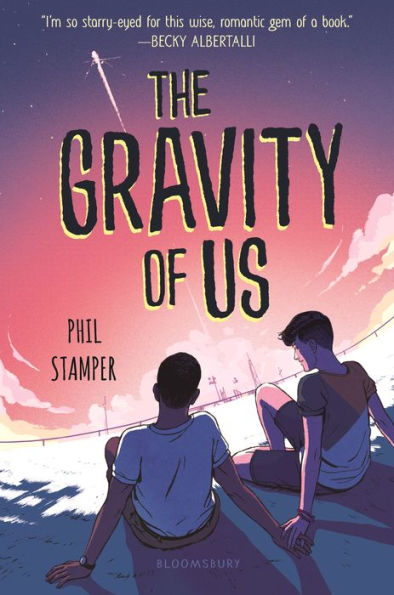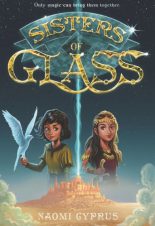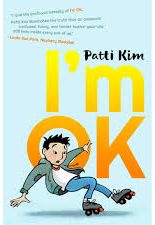
Buy This Book
“This crush is too strong. This crush is too powerful. This crush will be the end of me,” Cal. —The Gravity of Us
The Gravity of Us
by Phil Stamper
AR Test, Diverse Characters, LGBTQ
13+
Score
4.0
320
Cal has his life figured out. He loves living in Brooklyn, where he has friends and a plan. He’s gaining views for his live reporting on the social media app FlashFame, and his journalism career is about to take off with a major internship. But all of this turns upside down when his father—Cal Senior—receives word that his application to NASA has been accepted. Cal’s father is slated to be on the upcoming Mars mission, and their family must relocate to an idyllic small town in Texas where all the astronaut families live.
While he’s upset to lose his internship, Cal soon realizes that he still has the chance to hone his journalism skills. A reality TV network called StarWatch has exclusive control over the narrative around the space program—and therefore the related public interest and government funding. Instead of focusing on the fascinating science of the upcoming Mars mission, StarWatch documents the lives of the astronaut families solely for manufactured drama. When Cal decides to keep live-streaming his own experiences, he becomes an opponent of StarWatch, who are obsessive about their tight control over the astronauts’ public images. Soon, Cal finds himself caught up in the world of high-stakes publicity. He tries to portray his family and the rest of the astronaut families truthfully and honestly, while multiple media forces vie for public interest.
Romance happens when Cal meets and immediately is enamored with another astronaut’s son, Leon. Leon, an ex-star gymnast, suffers from depression and is reluctant to enter into a relationship with someone who thinks he can “fix him.” Cal and Leon immediately have chemistry, but before they finally instigate a real relationship, they try to understand each other and respect each other’s needs.
The Gravity of Us promises a space-centered story but delivers a story that’s more focused on PR and social media journalism than a future Mars mission. While Cal is determined to make the public care about NASA for the science, readers may find that they still don’t get to see as much science as they want. Readers looking for an ultra-realistic view of NASA’s operations, like in The Martian, will be disappointed. Many fascinating logistical aspects of space missions—such as astronauts’ rigorous psychological testing and training—are swept aside or ignored.
The romance is cute but hollow. Cal and Leon have no barriers separating them except for Leon’s depression, which is never really given the attention it needs to be a fully effective aspect of the plot. The main conflict between them is that Cal is concerned that Leon doesn’t know what to do after he graduates from high school. In the end, Leon tells Cal that he’s figured out what he wants to do. It’s anti-climactic and may disappoint readers who want reassurance that they don’t have to have their lives figured out at eighteen.
Overall, The Gravity of Us has little of the gravitational pull promised. While it draws on the images of outer space in its title and cover, the book uses a vague portrayal of NASA to show an ordinary teen romance.
Sexual Content
- Cal recalls interviewing a Republican Senate candidate and grilling him about “charges of sexual harassment.”
- Cal says his mom is cautious when entering his room because “she’s always afraid she’ll catch me doing ‘something,’ and we all know what that ‘something’ is, but I’m also not an idiot and can figure out how to do ‘something’ twice a day having never been caught thank you very much.”
- Cal recalls an old romantic fling with a boy named Jeremy, where he “sunk into his lips, the taste of Coors Light on our tongues.” Jeremy “was new and exciting, and he was there as I took a self-guided tour of my own queerness—something I may never fully find the right label for.”
- When Cal is with Leon, “I get the urge to kiss him . . . nowhere in my perverse mind do I think he needs this kiss to fix him. I want him, and I want to do it for me. And humanity, even. I want the world to be that much better because of our lips touching and his hand in my hair and…”
- Cal and Leon kiss. Leon’s “lips are soft and perfect and tug at mine like he’s been waiting for this moment forever. Like he’s been waiting for more than just a week to be with me like this. In seconds, our mouths are on each other and his hand is behind my neck. And my heart’s about to beat out of my chest. It’s too fast and not nearly enough.”
- Cal and Leon kiss again. “This one isn’t as passionate, it isn’t as hungry, but it makes my insides jump the same way. There’s a caring force in the tug of his lips, and in his bite, I lose control of my body and feel light-headed.”
- During a makeout session between Cal and Leon, “We’re pressed into each other, and there’s nothing on my mind but his taste. His tongue slips into my mouth, and I press mine against his. I moan softly because it feels so right. So perfect . . . just keep kissing him. We keep celebrating our closeness in muffled moans and gasped breathing.”
- When Cal and Leon are alone in a hotel room, “We pull off our shirts, and I press his body into mine. His breath hits my neck as our legs hook around each other. We’re a mash of tongue and teeth and warmth.” They stay the night together, but the book doesn’t go into detail about what else they do.
- Cal brings Leon over to his house because it’s “definitely empty,” with the implication that this is an opportunity for sex. “His face is pressed to mine as I get my key out and unlock the back door . . . and we push through the dark house.” The scene ends soon afterward without revealing any more detail.
Violence
- When Cal sees how upset his mom is, “I scan her for bruises, for covered arms, for anything—though I know Dad would never hurt her like that.” His suspicions are unfounded—although Cal’s parents argue often, they never get violent with each other.
- Cal says that the sound of his friend’s parents fighting in a neighboring apartment scares him. “The echoed sound of a fist breaking through a particleboard door settles in my head.”
- A man looks like “his whole body might be made of stone.” Cal says, “I have a feeling that if I were to punch him in the gut, I’d be the one hurting.”
- The characters wait anxiously for news about a jet, which was carrying NASA astronauts, that wrecked. One astronaut is killed and several are injured, but the crash isn’t described in detail.
- An unmanned NASA launch “explodes in the sky.” Cal describes being “barely knocked back by the blast, like a strong but very warm gust of wind.” Then the spacecraft “becomes nothing but some smoking ash.”
Drugs and Alcohol
- When he gets into the astronaut program, Cal’s father pours champagne for the whole family—“Even for you, Cal. It’s a special occasion.”
- Cal’s friend says that she likes “watching astronauts get drunk off champagne before falling face-first into a bush.”
- At an astronaut party, Cal sees “bottles of champagne sitting in a copper tub full of ice.” He notes that “no one would notice a bottle—or ten—missing from this supply.”
- Cal and Leon steal a champagne bottle from the party and go out back to drink it. Cal drinks the champagne. “The tart, fizzy liquid burns my throat as I swallow it down. The taste isn’t great, but I could get used to it.”
- Someone gives Cal gum “to cover that champagne breath.”
- Cal’s mother manages her chronic anxiety “with her therapy appointments and an assortment of low-dosage medication.”
- Cal steals some champagne from his parents and pops the bottle when he’s alone with Leon. They drink from it together. “I pull the bottle to my mouth and take a sip of the bitter foam.”
- Cal says, “I start to understand why people celebrate with champagne. It lifts me up, it celebrates my own energy.”
Language
- Profanity is used frequently. Profanity includes: damn, hell, shit, and fuck.
- “Oh my God” and “Jesus” are frequently used as exclamations.
- Cal refers to Clear Lake, Texas as “literal hell” because of its hot weather.
Supernatural
- None
Spiritual Content
- The Mars mission is named Orpheus, after the story of Orpheus and Eurydice from Greek mythology. A character explains how “Eurydice dies; Orpheus takes his magical lyre and travels to Hades to save her. He plays his lyre for Hades, who promises to return Eurydice under one condition: she would follow, but if he turned to look at her, she’d be gone forever.”
by Caroline Galdi
“This crush is too strong. This crush is too powerful. This crush will be the end of me,” Cal. —The Gravity of Us
Latest Reviews

Driven

Goodbye Days

Blood of Troy

Will’s Race for Home

Animal Superstars: And More True Stories of Animal Talents

Temple of Secrets

Lifeboat 5

Rock ’n’ Goal

Dogku






